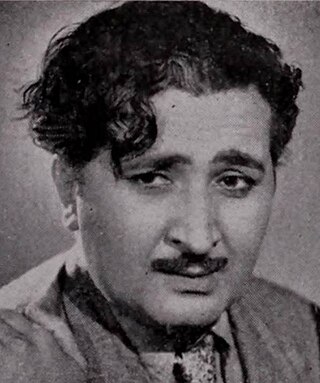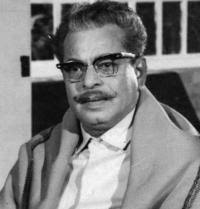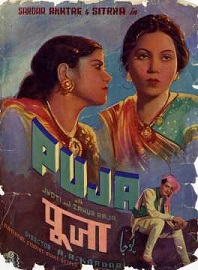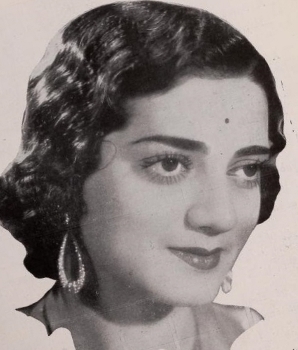Related Research Articles
The Filmfare Lyricist Award is given by the Filmfare magazine as part of its annual Filmfare Awards for Hindi films.

Jayant was an Indian actor. He was the father of actors Amjad Khan and Imtiaz Khan. His notable works are in films like Amar, Memdidi and Nazneen. He worked in many movies with Dilip Kumar and Madhubala.
Motilal Rajvansh was an Indian actor and the winner of Filmfare Best Supporting Actor Award for Devdas (1955) and Parakh (1960). He is credited with being among Hindi cinema's first natural actors.
Krishan Niranjan Singh, known as K. N. Singh in Indian cinema, was a prominent villain and character actor. He appeared in over 200 Hindi films over a long career stretching from 1936 to the late 1980s.

Angeline Malik is a Pakistani director, actor, producer, model, television host and activist.

Kanhaiyalal was an Indian actor who acted in 122 films in his career, primarily in Hindi films produced in Bollywood, the Mumbai-based film industry.

Gajanan Jagirdar was a veteran Indian film director, screenwriter and actor. He worked in Hindi Cinema, also called Bollywood, as well as Marathi cinema. The period of 1942 to 1947, saw his rise as a film director with Prabhat Films.

Watan (transl. Homeland) is a 1938 Hindustani costume drama film directed by Mehboob Khan. Produced by Sagar Films, the film had story by Mehboob Khan and Wajahat Mirza. The cinematographer, as for most Sagar films, was Faredoon Irani. Following the successful music of Manmohan (1936), Sagar Movietone retained Anil Biswas as the in-house music director, scoring music for Watan along with other releases of the time from the studio. The cast of the film included Kumar, Bibbo, Maya Banerjee, Yakub Lala, Sitara Devi and Kayam Ali.
Manmohan is a 1936 Indian Urdu/Hindi-language romantic tragedy film directed by Mehboob Khan. This was Khan's third film for Sagar Movietone after Al Hilal (1935) and Deccan Queen (1936). The cinematographer was Faredoon Irani who, starting from Mehboob Khan's Al Hilal (1935), went on to establish a long working relationship with him lasting till Khan's last film Son of India (1962). The music was composed by Ashok Ghosh assisted by Anil Biswas. The story writer was Zia Sarhadi who also wrote the lyrics, screenplay and dialogue in addition to acting in the film. Though he had started his writing career on Khan's backing for Deccan Queen (1936), it was with Manmohan that he achieved success. The film was inspired by Devdas, (1935), which was a big hit at the box office. Surendra was chosen as the singing star to rival K. L. Saigal from New Theatres Calcutta, whose songs from Devdas had mesmerised the nation. Though Manmohan was referred to as the "poor man's Devdas" the film went on to do well and the songs became very popular. The film starred Bibbo, Surendra, Yakub, Kayam Ali, Bhudo Advani and Mehdi Raza.
Jagirdar (Landlord) is a 1937 Hindi romantic melodrama film directed by Mehboob Khan, and starring Bibbo, Motilal, Surendra, Yakub, Pande, Sankatha Prasad, Pesi Patel and Maya Banerjee.
Grihalakshmi is a 1934 Hindi social family melodrama film directed by Sarvottam Badami with story by Dr. Jayant Shyam and cinematography by Faredoon Irani. The film was produced by Sagar Movietone and had music by S. P. Rane. The cast included Sabita Devi, Jal Merchant, Yakub, Kamala Devi, K. C. Dey, Swaroop Rani and Asooji.

Teen Sau Din Ke Baad is a 1938 Hindi social comedy film directed by Sarvottam Badami. This was Badami's first comedy film and it was a success at the box-office; he went on to direct two more comedies after this, Aap Ki Marzi (1939) and Ladies Only (1939), also successes. The film was produced by Sagar Movietone, with story written by Babubhai A. Mehta and dialogue by Wajahat Mirza and Waqif. The music was composed by Anil Biswas with lyrics by Zia Sarhadi. The director of photography was Faredoon Irani and the film starred Bibbo, Motilal, Sabita Devi, Yakub, Pesi Patel and Gulzar.
Kokila (transl. Nightingale) is a 1937 Hindi social family drama film directed by Sarvottam Badami. The music was composed by Anil Biswas with lyrics written by Siddiqui and Zia Sarhadi. The story was adapted from the well-known novel Kokila, written by Gujarati writer Ramanlal Vasantlal Desai. The film starred Motilal, Sabita Devi, Shobhna Samarth, Maya Bannerjee, Sitara Devi, Pesi Patel, Siddiqui and Kayam Ali.

Pooja (Worship) is a 1940 Indian Hindi/Urdu-language psychological drama film directed by A. R. Kardar. The music director was Anil Biswas, with lyrics by Khan Shatir Ghaznavi. Produced by National Studios, the story, screenplay and dialogue writer was M. Sadiq and the cinematographer was P. G. Kukde. The film starred Sardar Akhtar, Zahur Raja, Sitara Devi, Jyoti, Sankatha Prasad, Sunalini Devi, Bhudo Advani and Baby Meena.

Surendra was an Indian singer-actor of Hindi films. Known by his mononym, Surendra was born and educated in Punjab to be a lawyer by profession. He came to Bombay to become a singer on the recommendation of a Delhi distributor and his friends. He was "picked" by Mehboob Khan whom he met at Sagar Movietone, to sing and act in films as an alternative to the then Calcutta-based singer-actor, K. L. Saigal. Surendra started his career with his debut starring role in Deccan Queen (1936), directed by Mehboob Khan. He soon became a part of Sagar Movietone when his song "Birha Ki Aag Lagi More Man Mein" from the film became an "instant hit".

Sabita Devi (1914–1965) was a Hindi film actress in Indian cinema. She is stated to be one of the "prominent" leading ladies of the "pioneering era" of Indian cinema along with Mehtab, Bibbo, Durga Khote, Gohar, Devika Rani and Seeta Devi. A Jewish by birth, she changed her name to find acceptability in Hindi cinema like the other Anglo-Indian and Jewish actresses of her time, Sulochana, Seeta Devi, Madhuri, and Manorama. After initially working with British Dominion Films Ltd., Calcutta, she shifted to Bombay and performed mainly in films produced by Sagar Movietone with her co-star in most films being Motilal. Some of the popular films with Motilal were Dr. Madhurika (1935) and Kulvadhu (1937) directed by Sarvottam Badami. Their first film together was Shaher Ka Jadoo (1934), which was also Motilal's debut film, and then Lagna Bandhan (1936) both directed by Kaliprasad Ghosh. She acted in Silver King (1935) with Motilal. It was an action film directed by C. M. Luhar, which became a "huge success".

Sagar Movietone also Sagar Films, Sagar Film Company and Sagar Productions was an Indian film production company involved in the making of films for Indian cinema. It was launched by Ardeshir Irani with Chimanlal Desai and Dr. Ambalal Patel in 1929 in Bombay, Maharashtra, India. Sagar was initially started as a branch company of Ardeshir's Imperial Film Company. Several key figures from Imperial, such as Mehboob Khan were shifted to Sagar. The studio was in operation from 1930 to 1939. In 1940, it combined with General Pictures to form National Studios. It made "Parsi theatre based films, mythologicals and stunt movies". Sagar fostered the career of many artists who rose to prominence. Early directors such as Prafulla Ghosh, Sarvottam Badami, Ezra Mir and Nanubhai Vakil were promoted by the company. Mehboob Khan got his first break as a director in Al Hilal in 1935. He was referred to as "the most important alumnus" from Sagar, who went on to become one of Indian cinema's "most influential film-makers".

Bhudo Advani was an Indian character actor and comedian. He started his acting career in theatre with the notion of spreading awareness on social issues. He came to Bombay on the advice of an Ajanta Cinetone representative and was offered a role in the film Afzal, also called Hoor-E-Haram in 1933, directed by Mohan Bhavnani. He later joined Sagar Movietone, becoming an important fixture in most films produced by them. He turned from character roles to comedy performing in Dr. Madhurika (1935), directed by Sarvottam Badami, Deccan Queen (1936) and Do Diwaane (1936), by C. Luhar.
Hum Tum Aur Woh may refer to:
Rose Musleah was an Indian theater and film actress of Jewish origin who played in Tollywood. She acted in silent films at first and later in talkies. Remembered as the "dancer actress" of silent cinema. Her films dealt with conflicts between tradition and individual choice.
References
- 1 2 Rajadhyaksha, Willemen, Ashish, Paul (2014). Encyclopedia of Indian Cinema (2, revised ed.). Routledge. p. 276. ISBN 9781135943189 . Retrieved 7 September 2014.
{{cite book}}: CS1 maint: multiple names: authors list (link) - ↑ Ahmed, Rauf (2008). Mehboob Khan The Legends of Indian Cinema Series. Delhi, India: Wisdom Tree. p. 33. ISBN 9788183281065.
- ↑ "Hum Tum Aur Woh 1038". citwf.com. Alan Goble. Retrieved 7 September 2014.
- ↑ "Hum Tum Aur Woh 1938". muvyz.com. Muvyz, Inc. Retrieved 7 September 2014.